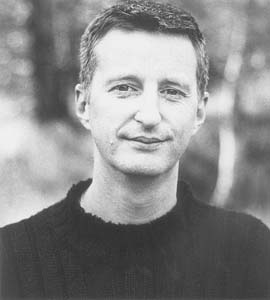New Music From Old Lyrics
By Gina Arnold
WOODY GUTHRIE is probably best known as the author of the monotonously tuned "This Land Is Your Land," a song many Americans sing repeatedly in grade school and never sing again. But his legacy as a radical folk singer is much deeper and more inspiring than that one song would imply.
Guthrie, an Oklahoman, paid tribute in song to the people of the Dust Bowl, the WPA and rural America; he is, in some weird but essential way, almost single-handedly responsible for the zeitgeist that later inspired Joan Baez, Bob Dylan and Beat poetry.
In short, he's a man for whom praise is always in order. Nevertheless, Mermaid Avenue--the new album by Billy Bragg--almost takes reverence for Guthrie one step too far. Talk about your high concept!
Mermaid Avenue features unused lyrics by Guthrie--who became ill with Huntington's disease in 1947--unearthed by his daughter Nora and then set to music by contemporary punk-folkie Bragg with the help of American roots-rockers Wilco and Natalie Merchant.
On paper, such a lofty collaboration sounds frankly over-intellectualized. Happily, the result is not nearly as off-puttingly pious as it sounds. In fact, the best way to enjoy Mermaid Avenue is to forget its main tenet and just ... listen. On a musical level, it's a very enjoyable record, full of songs that have both heart and soul, not to mention pleasingly authentic touches of Hammond B-3 organ, violin and harmonica. My own favorites are "She Came Along to Me," "Ingrid Bergman," "One by One" and "The Unwelcome Guest."
There's simply no question the record is suffused with a lovely and wholesome musical atmosphere that sets it apart from many of today's releases. The tracks manage to blend the sound of the current artists--Wilco and Bragg--without ever losing sight of Guthrie in the process. "Hoodoo Voodoo" recalls kids' nonsense songs like Guthrie's "Riding in My Car," while "Christ for President," "Eisler on the Go" and "I Guess I Planted" are in a more political vein, a la "Deportee" and "This Train (Is Bound for Glory)"--not to mention Bragg songs like "A New England" and "Sexuality."
ALTHOUGH Bragg is the driving force behind this record, the songs "California Stars," "Christ for President," "At My Window, Sad and Lonely," "One by One," "Hoodoo Voodoo," "Another Man's Done Gone" and "Hesitating Beauty" are sung by Wilco's Jeff Tweedy, and they sound, well, like Wilco songs. A few, however, are better than that: more like Uncle Tupelo.
"Birds and Ships" is sung by Natalie Merchant and--despite lyrics by Guthrie and music by Bragg--sounds like nothing so much as a Natalie Merchant song.
And therein lies the rub. What would prompt songwriters to use another songwriter's lyrics (sans music)? Reverence, yes, but is that enough to justify the practice? Guthrie wrote fine lyrics--although some here, notably "Walt Whitman's Niece" and especially "She Came Along to Me," sound half-finished, perhaps even rejected by him as too simplistic. (The latter song includes the awkward verse "[women have] not been any too well known for brains and planning and organized thinking ..." for example.) But they are about the things he thought and cared about; they are dredged from his soul, not Bragg's. True, Bragg's entire repertoire has dealt with similar subjects, but does his use of Guthrie's words denote some lack of inspiration?
I hope not. But this whole project begs the question. Why don't songwriters just use already-acclaimed poetry for their lyrics, rather than writing down their own thoughts. On occasion, of course, they do. Joni Mitchell uses the text of Yeats' "The Second Coming" on her new record; Bragg himself has used the words of William Blake's "Jerusalem," and most famously of all, the Byrds used part of the text of Ecclesiastes for the song "Turn, Turn, Turn."
Although those songs are all excellent in their way, this is not a practice that could possibly be totally fulfilling for a songwriter. Besides, it's one thing to use poetry, and another to use words that were intended by their author to be set to music. Guthrie, who died in 1967 of a terrible, debilitating disease that traps the brain in a prison of useless flesh, probably had melodies of his own in mind for these lyrics.
Bragg's tunes and extremely sensitive arrangements are very, very good; and any suspicion of presumptuousness on his part has to be eliminated by the fact that Guthrie's daughter requested this record be made. Moreover, the history of folk music--the music that Guthrie himself archived and resurrected--is the history of plundering other people's repertoires. Guthrie himself used plenty of non-original material ("Muleskinner Blues"), and countless traditional folk songs have wound up, over the course of 300 years or so, as the text for folk and even pop music. "La Macarena" is one current example of such a transformation, so is "Louie Louie."
But I don't know. As a writer, I still feel funny about the idea of a someone re-creating unfinished material in their own image. When, on "Way Over Yonder in the Minor Key," Bragg sings about deeply Oklahoman experiences like Okfuskee and the Buckeye Creek and winds up with "ain't nobody can sing like me," the ghostly echo of Guthrie's whole ethos is so resonant, so whole, it's frightening. That may be because Bragg did such a great job--or it may be a weird case of sonic and emotional trespassing. However, Mermaid Avenue is certainly a record worth buying in order to judge these issues for yourself--or to enjoy without thinking about Guthrie at all.
[ San Jose | Metroactive Central | Archives ]
Copyright © Metro Publishing Inc. Maintained by Boulevards New Media.
![]()
 Billy Bragg and friends channel Woody Guthrie's spirit on 'Mermaid'
Billy Bragg and friends channel Woody Guthrie's spirit on 'Mermaid'
From the July 30-Aug. 5, 1998 issue of Metro.
![[Metroactive Music]](/music/gifs/music468.gif)